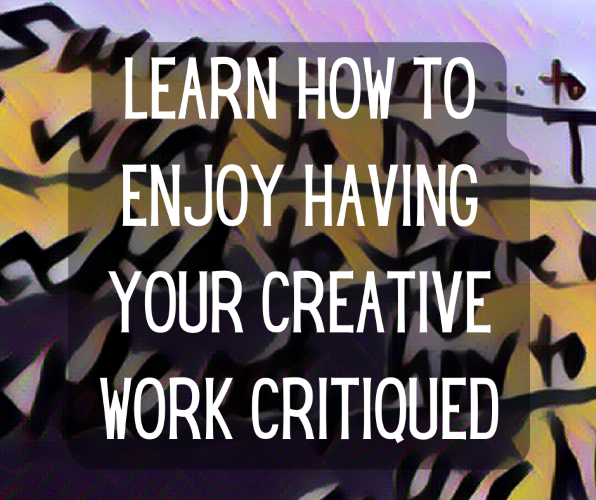Learn how to enjoy having your creative work critiqued might sound like an impossible assignment, but, in my experience, releasing the dislike or fear is about mindset.
As I’ve mentioned in an earlier blog post, the value of creating relationships with critique partners, I remember the jitters that came when first handing off a manuscript for critique.
Like most things precious to us, we don’t want to have our work dissected, altered, and criticized. We want it to remain whole, unchanged, and pleasing just as it is. And sometimes, we believe that our creation reflects us; so, critique it, and you critique us. We don’t enjoy hearing about the parts of our creation, and thus about us, the creator, that might need improvement.
But why are we so fragile about this? I can only speak for myself. Maybe you can relate.
When I first received a critique of the first draft of my manuscript, the many red markings in the margin (or wherever they fit) rose from the page like warning signals of personal failure. Even when I told myself I’d be okay with whatever came back to me, those pages of red markings were difficult to digest… at first.
The next day, after I’d slept on the comments, interestingly, I felt differently about them. One or two of the comments immediately stood out; their improvement to my work was undeniable. If one or two comments made that much of a positive difference, what might all the rest do?
And just like that, I transformed from a wounded ego to an eager creator once more—more excited about my project than ever.
Instead of fearing failure or personal judgment, I experienced renewed excitement about my manuscript, and deep gratitude for the person who’d taken the time to read it, and the care to comment so generously.
My mindset had changed. The critique experience became thoroughly positive; it became a lesson in which I quickly found great value. I was now excited to contemplate and evaluate each thought or suggestion given to me. I moved through each comment with care and consideration. For each critique provided, one of the following occurred:
- I accepted a critique suggestion outright.
- I used the clear misunderstanding of a critique remark to change a manuscript description, plot element, character intention, word choice, or another such manuscript-related component. Each change brought a noticeable improvement.
- I reworked a critique to better suit the intention of my manuscript.
- I altogether discarded a critique.
Sometimes, well… I’d say, most of the time, we’re too close to our work to see objectively where it needs improvement.
Here are a few examples of errors or omissions we can too easily miss:
- Words that don’t convey the meaning we intend.
- Improper use of pronouns.
- Improper use of tense.
- Repetition of phrases or words or overused expressions.
- Use of cliches.
- Misspelled words.
- Holes or gaps; the missing bridges that connect the plot or scene structure.
- Creation of a character who lacks depth or isn’t relatable to the reader.
- Inconsistencies in the timeline or other details.
In time, handing a manuscript or some other heartfelt creation over to a peer for critique becomes easier. We,
- Move past worrying about being judged and get back to the business of producing the best creation we can.
- We see the remarkable value in each critique—even the critiques that at first seem too heavy-handed or harsh.
- Each remark becomes a path to improvement of creation and craft.
To enjoy having your creative work critiqued might sound like an impossible assignment, but, in my experience, releasing the dislike or fear is about mindset.
Here’s a link to a critique partnering website I found helpful: CritiqueMatch

2 thoughts on “Learn how to enjoy having your creative work critiqued”
I loved how you went about it. I’m also all about constructive criticism. But drawings line is necessary. Initially can look like attacks but later one can fall for accepting all of those remarks. Down the lane the better practice one get tuned to is to identify which one should becknsidered and the other to let pass.
Also if you’re to become an author or literary person then climbing such a ladder is a great guide.Thanks for sharing. Xx
Isa A. Blogger
Thanks for your thoughts, Isa. Cheers.
Comments are closed.